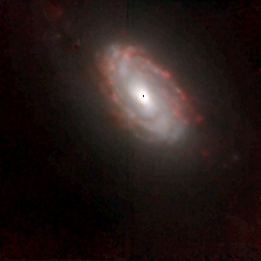
Back NGC 23 Arabic NGC 23 (مجره) ARZ NGC 23 AST NGC 23 Azerbaijani NGC 23 Byelorussian NGC 23 BS NGC 23 Catalan NGC 23 CE NGC 23 Czech NGC 23 German
| NGC 23 | |
|---|---|
 NGC 23 by HST | |
| Observation data (J 2000.0 epoch) | |
| Constellation | Pegasus |
| Right ascension | 00h 09m 53.411s[1] |
| Declination | +25° 55′ 25.46″[1] |
| Redshift | 0.015231[2] |
| Heliocentric radial velocity | 4,568 km/s[3] |
| Distance | 173.5 Mly (53.21 Mpc)[3] |
| Apparent magnitude (V) | 11.9 mag |
| Absolute magnitude (V) | -21.85 |
| Characteristics | |
| Type | SBb[4] |
| Apparent size (V) | 1.9′ × 1.4′ |
| Other designations | |
| LEDA 698, UGC 89, Mrk 545, PGC 698, GC 9.[2][5] | |
NGC 23 is a spiral galaxy located in the northern constellation of Pegasus, around 173.5 megalight-years distant from the Milky Way.[3] It was discovered by William Herschel on 10 September 1784. In the Webb Society Deep-Sky Observer's Handbook,[6] the visual appearance of NGC 23 is described as follows:
Bright, extended ellipse; a bright nuclear structure is noticeably elongated; two weak spiral enhancements emerge from opposite sides of the nucleus, one curving towards a bright star attached on the south end. The galaxy is likely interacting with NGC 9.
The shape of this galaxy is described by its morphological classification of SBb, which indicates it is a barred spiral (SB) with spiral arms that are moderately tightly wound (b).[4] It is a luminous infrared galaxy with star-forming clumps.[7]
- ^ a b Cite error: The named reference
Skrutskie2006was invoked but never defined (see the help page). - ^ a b Cite error: The named reference
nedwas invoked but never defined (see the help page). - ^ a b c Cite error: The named reference
tully2016was invoked but never defined (see the help page). - ^ a b Cite error: The named reference
GarcíaLorenzo2015was invoked but never defined (see the help page). - ^ Cite error: The named reference
SIMBADwas invoked but never defined (see the help page). - ^ Cite error: The named reference
Webbwas invoked but never defined (see the help page). - ^ Cite error: The named reference
Larson2020was invoked but never defined (see the help page).